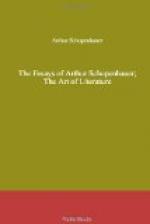It is incredible what a different effect is produced upon the mind by thinking for oneself, as compared with reading. It carries on and intensifies that original difference in the nature of two minds which leads the one to think and the other to read. What I mean is that reading forces alien thoughts upon the mind—thoughts which are as foreign to the drift and temper in which it may be for the moment, as the seal is to the wax on which it stamps its imprint. The mind is thus entirely under compulsion from without; it is driven to think this or that, though for the moment it may not have the slightest impulse or inclination to do so.
But when a man thinks for himself, he follows the impulse of his own mind, which is determined for him at the time, either by his environment or some particular recollection. The visible world of a man’s surroundings does not, as reading does, impress a single definite thought upon his mind, but merely gives the matter and occasion which lead him to think what is appropriate to his nature and present temper. So it is, that much reading deprives the mind of all elasticity; it is like keeping a spring continually under pressure. The safest way of having no thoughts of one’s own is to take up a book every moment one has nothing else to do. It is this practice which explains why erudition makes most men more stupid and silly than they are by nature, and prevents their writings obtaining any measure of success. They remain, in Pope’s words:
For ever reading, never to be read![1]
[Footnote 1: Dunciad, iii, 194.]
Men of learning are those who have done their reading in the pages of a book. Thinkers and men of genius are those who have gone straight to the book of Nature; it is they who have enlightened the world and carried humanity further on its way. If a man’s thoughts are to have truth and life in them, they must, after all, be his own fundamental thoughts; for these are the only ones that he can fully and wholly understand. To read another’s thoughts is like taking the leavings of a meal to which we have not been invited, or putting on the clothes which some unknown visitor has laid aside. The thought we read is related to the thought which springs up in ourselves, as the fossil-impress of some prehistoric plant to a plant as it buds forth in spring-time.
Reading is nothing more than a substitute for thought of one’s own. It means putting the mind into leading-strings. The multitude of books serves only to show how many false paths there are, and how widely astray a man may wander if he follows any of them. But he who is guided by his genius, he who thinks for himself, who thinks spontaneously and exactly, possesses the only compass by which he can steer aright. A man should read only when his own thoughts stagnate at their source, which will happen often enough even with the best of minds. On the other hand, to take up a book for the purpose of scaring away one’s own original thoughts is sin against the Holy Spirit. It is like running away from Nature to look at a museum of dried plants or gaze at a landscape in copperplate.




